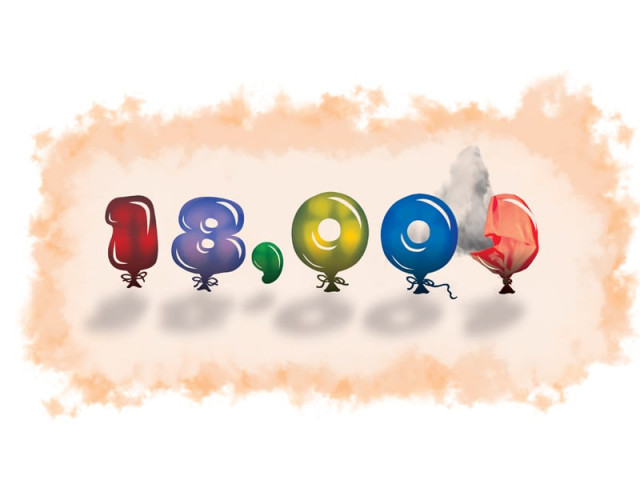Five years on, stock market leaves much to be desired
KSE Index has set new records, but real returns have not kept pace.

KSE Index has set new records, but real returns have not kept pace. ILLUSTRATION: FAIZAN DAWOOD
Democracy is the best revenge. The current government has effectively completed five years, a first for any civilian administration in Pakistan. Now all eyes are on the next step which is on-time elections and the successful transition to another democratic setup. That will be another first.
No one disagrees that it is a major achievement, for a 66-year old country where we have had army rule for 36-years, but in all honesty, now that this has been achieved everyone is asking questions about the performance of the current setup in various fields.
The answers, especially according to research conducted by Topline Securities, are mixed at best and depressing at worst.
The usual questions are targeted at the security situation, economic growth, the human rights situation and the performance of various institutions like the judiciary, the media, and last but not least financial institutions.
This is one area where performance has been depressing, to say the least. The average stock market investors in Pakistan have witnessed one of the worst periods, according to Topline Securities. “Equity returns remained depressing in the last five years; market depth was weak while companies were not able to raise funds aggressively for expansion.”
When the PPP-led government took charge on March 17, 2008, the benchmark KSE Index was 15,043 points. And on the day the government stepped down, it stood at 17,741 points generating an unimpressive return of just 18%. The blame does not lie with the stock market or the quality of the investment opportunities. This is a fallout of the challenging global environment and local security conditions. The economic slowdown also affected the local bourses during the last five years.
In fact, according to Topline Securities, in US dollar terms, investors lost 24% in the last five years. During the same period where investors lost 24% in Pakistan, people lost 1% in India, gained 100% in Indonesia, 110% in Thailand and 146% in the Philippines. Market capitalisation that was Rs4.6 trillion ($73 billion) in March 2008 or 46% of GDP, is now at Rs4.3 trillion ($45 billion) or 19% of GDP proving that the market has not grown in relation to the overall economy.
Though the market has performed well in 2012, this was mainly due to the sharp fall in interest rates, and the average annual return in the last five years is not at all impressive compared to average inflation of 12%.
For example, if someone who had invested in T-Bills or National Saving Schemes in March 2008, that person would have made much more than someone who invested in equities.
Apart from the lack of returns, the pace of equity offerings was also very slow which is a clear indication of the slowdown in industrial expansion. Compared to average annual equity offerings of 30 in the 1990s and eight in the 2000s, there were just five Initial Public Offerings (IPO) a year, on average.
And that is not all. According to data provided by Topline Research the average size of the IPOs over the last five years was also much smaller.
The average size of IPOs was Rs390 million in the last five years, which is considerably lower than average witnessed in the 2000s. The slowdown or virtual cessation of privatisation also hampered growth in the market. Government offerings that has played a key role in the overall development of stock market were absent during the 2008-13 period.
Expectations of the next democratic setup are much higher.
Published in The Express Tribune, March 25th, 2013.
Like Business on Facebook to stay informed and join in the conversation.



















COMMENTS
Comments are moderated and generally will be posted if they are on-topic and not abusive.
For more information, please see our Comments FAQ